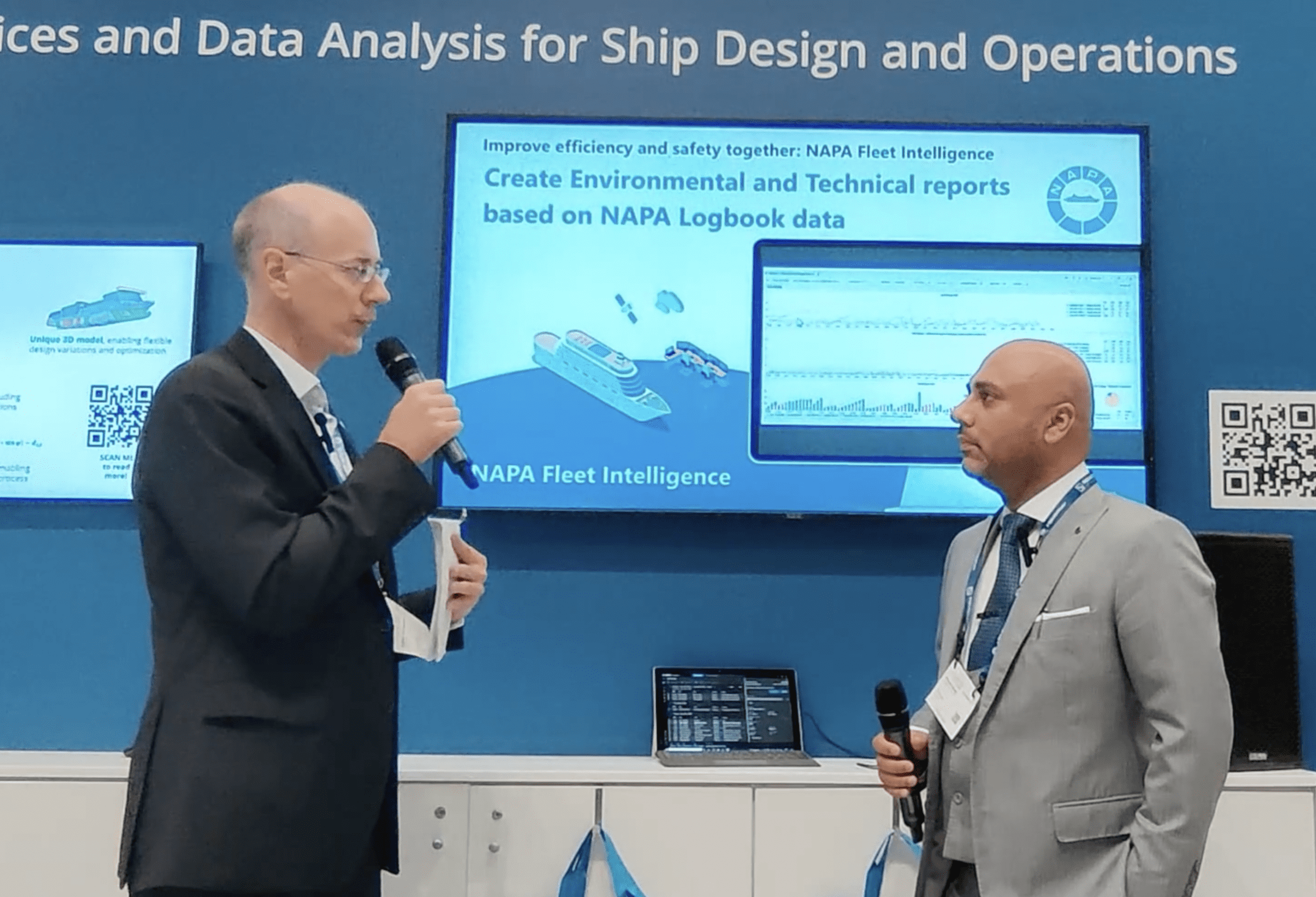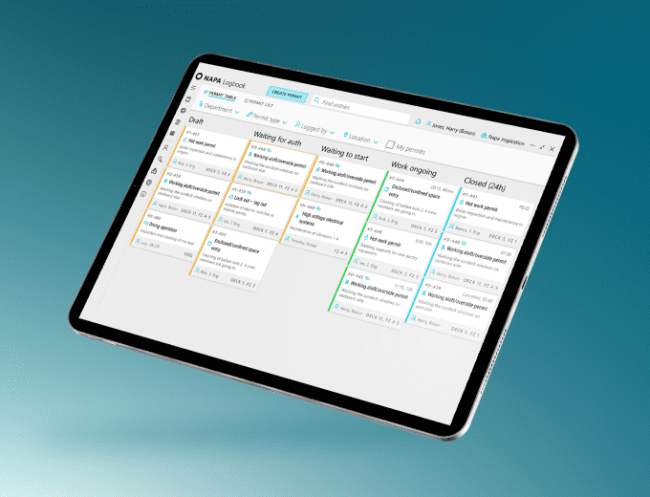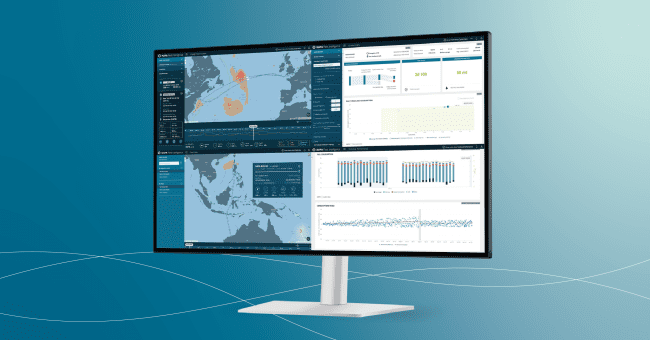Interview: How Columbia Cruise Services is easing shoreside reporting with NAPA Logbook

Vikram Dang of Columbia Cruise Services talks about using NAPA Logbook to make ESG, environmental and technical reporting automated, error-free and standardized on the shoreside.
The industry has been embracing ESG-centric solutions in its operations for a while now. With the upcoming implementation of CII reporting, along with green financing, and the need for further transparency, the value of accurate data collection and analysis is only becoming more apparent. In this complex environment, digital tools like the Electronic Logbook can take some pressure off the crew’s shoulders by easing data collection and reporting.
At SMM 2022 in Hamburg, we had the privilege to catch up with one of our core partners and valued customers, Columbia Cruise Services, who have found an ingenious way to use the NAPA Logbook to make ESG, Environmental and other technical reporting accurate and easy, without disrupting the daily operations and processes already in place.
You can watch the SMM Stand Talk video here. In this extended version of the interview, Vikram Dang, Deputy Head of Technical Department at Columbia Cruise Services (CCS), talks about reducing crew workload, easing data reporting with automated entries and standardizing record-keeping for the whole fleet. Take a read:
NAPA: Could you tell us a bit more about what made Columbia Cruise Services look at Electronic Logbook for ESG and regulatory reporting?
Vikram Dang: Shipping is a complex industry, and we work mostly within the cruise industry, where the companies are market listed with significant ESG responsibilities. To add to it, we have stringent regulatory obligations and mandatory reporting requirements. Therefore, there is a strong realization for the need of reliable data while reducing the crew’s workload.
We see digitalization, transparency, and automation as the precursors for smarter, and at the same time, greener shipping. CCS as a primary stakeholder saw this as an opportunity to digitalize and a responsibility work out a single solution. Being a third-party ship manager, it was not easy as we cater to different clients and their varied needs, further we do not choose the vessels and their equipment.
It was therefore important to identify a solution which was modular and easily deployed on our various client ships and addressed all the needs and requirements – and NAPA Logbook is the solution we went with.
NAPA: Could you share some of your general experiences of shifting from paper logbooks to electronic logbooks?
Vikram Dang: NAPA’s electronic logbook is one of the few changes which has been well received by everyone onboard and onshore. It was a major change to our process and like every change this was about managing risks and its mitigation. We, in collaboration with NAPA, worked out an agile roadmap on how to implement this. We were clear-eyed with security, resiliency, crew acceptability and compliance related risks.
The crew playing the key role here, we took them onboard and together with NAPA’s modular platform we implemented the application.
We trained the crew, told them our ideology was to minimize their workload, reduce their manual entry, and increase automation. Once this thing was communicated, all stakeholders were on board and the process became quite simple. As a result, we started releasing new modules rather quickly, while limiting our exposure to risks.
Increased transparency and process standardization with single platform environment for vessel crew and CCS office benefits greatly from ‘reporting once’ principle, thereby reducing duplications and increasing productivity. Further, data analysis with NAPA Fleet Intelligence and availability of digital historic data trends are great tools for operations optimization.
NAPA electronic logbook, combined with other products, is a complete solution for record keeping, situational awareness, voyage reporting, checklists, and data analytics.
NAPA: So, as a result, has this trade-off paid off?
Vikram Dang: Yes, not only has our processes standardized, and reporting and crew workload eased, but also all our fleets are now paper-free; and all crew and stakeholders are very happy with the results.
NAPA: Going back to the shoreside, what kind of reporting needs do you have, and what areas and functions are these reports created for?
Vikram Dang: Our reporting can be broadly categorised into three categories: First, we have the ESG and statutory reporting for us and our clients; second, there are regulatory obligations like MRV / DCS, CII, and such; and third, we have the company-specific reports, which are mainly around vessel operations performance covering machinery, hull, passengers, safety, emissions, and voyage. We have been doing these in the past as well.
Now, with the need for standardized optimisation and stringent regulations, our processes are becoming much more efficient.
NAPA: For all this analysis and reports, how do you ensure that you get accurate data from on-board?
Vikram Dang: The fundamental requirement for any analysis, reporting or optimization tool is transparent, arcuate, and reliable data; and we have worked closely with the NAPA team to ensure the same. Together, we have reduced the manual input to bring in automated entries.
We have swapped the roles of the crew from the traditional one of doing manual data entries to that of a verification role, where all they need to do is verify and approve the automated entries in-conjunction with various plausibility checks. Lastly, the NAPA Fleet Intelligence offers various standardized data analysis reports where the data inaccuracies are easily highlighted, thus further reducing chances of manual entry errors.
By implementing these digital tools, we have standardized and simplified our data entry and reporting process. So, wherever you go in our fleet, it is the same process, it is the same setup and we have started to see the benefits of this.
NAPA: What kind of benefits have you seen now that you can get these reports automatically via a cloud-based solution on the shore side?
Vikram Dang: To list a few, we see:
- Improved situation awareness and decision-making based on real-time data.
- Efficiency gain and improved collaboration – data-driven business processes.
- Improved technical management performance – use of best practice; process standardisation; reduced workload and availability of historic data.
- Claims handling is another major area where the easily available historic data cuts a lot of unnecessary communication and workload.
- Easily available data for the vessel owners and increased transparency.
Now, the data and its analysis are transparent as well as processes are standardized, while reducing the workload.
NAPA: Aside from environmental reporting, how has the technical management benefited by using the electronic logbook data on the shoreside?
Vikram Dang: With Electronic Logbook, together with the APIs to the vessel onboard platforms, we are able to capture a lot of quality data and we are very happy with the data analysis results achieved by the team at NAPA.
We are currently capturing vessel-performance-related data such as water balance, fuel efficiency, ballast conditions, voyage performance etc. This data was not available to us earlier or we relied upon various manual excel sheets and individual interpretations.
Historic data and trends are also easily available and stored. We are further looking to expand into NAPA for incident reporting as we improved situation awareness and decision-making based on almost real-time data. Going forward, it is going to be like the aviation industry. So, as a passenger, along with your ticket and what it costs, you will also know what the CO2 implication of that journey is.
Our end goal here is to tell our client what their Co2 implication per passenger, per cruise is; and we want to predict it for them – that’s the way forward!
NAPA: What would you recommend to your colleagues in other companies who are looking forward to automating and enhancing their processes for ESG and regulatory reports?
Vikram Dang: Digitalization and standardization are the most important topic in the industry and there is no one-size-fits-all solution, but it is important not to dive head-first into digitalizing; but to identify end result required and work the way back to capture the maximum spectrum with one solution — the key should be one single platform environment, while reducing the workload for the crew and shoreside teams.
Want to know more?
Get in touch with our experts to hear how NAPA can help you, or start by reading more about NAPA Logbook.


